DOWNLOAD NEWS 2013/9 Beluah Extra
by Brian Wilson
See the Download News archive here.
With so many fine new recordings appearing at such
a rate that there would seem to be no problem besetting the classical
music market, you may wonder why we need to turn to the likes of Beulah,
Naxos Classical Archives and High Definition Tape Transfers for the
reissue of gems from the past. Indeed, I’m no lover of crackly
old recordings for their own sake but almost everything that Beulah
sends to me for review, usually with the crackle eliminated, or nearly
so, stays in my library in some form or other – most recently I’ve
been saving their releases on USB, since both my music systems allow
me to play mp3 and wma (up to 320kb/s) via a socket on the front. Though
Beulah, like Naxos Classical Archives, have stuck to mp3, whereas HDTT
offer 16– , 24-bit and even DSD downloads, I’m almost always
impressed with the sound quality which they have achieved.
There have been so many releases from Beulah recently, including complete
albums available from iTunes, Amazon and 7digital that it seemed best
to deal with them in a separate edition of DL News to celebrate the
forthcoming 20th birthday of the label. All the current month’s
releases are publicised on their homepage,
with links to earlier months. June 2013 releases are here.
Beulah Extra – June 2013
Mily BALAKIREV (1837-1910) Islamey (Oriental Fantasy,
orch. Casella) [9:34]
Philharmonia Orchestra/Eugene Goossens – rec.1957. ADD/stereo
BEULAH EXTRA 1BX252 [9:34] – from eavb.co.uk
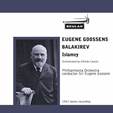 I’m
a great fan of Balakirev, especially of his First Symphony, though I
have to admit that my better half is right when she says that his music
doesn’t ‘go’ anywhere; I just enjoy the scenery on the
journey. Islamey is a colourful work, depicting the more exotic
parts of the Russian Empire – as such it makes a good pairing with
Borodin’s Steppes of Central Asia (below). The piano original
was a Horowitz speciality but it’s even more colourful in its orchestral
guise here.
I’m
a great fan of Balakirev, especially of his First Symphony, though I
have to admit that my better half is right when she says that his music
doesn’t ‘go’ anywhere; I just enjoy the scenery on the
journey. Islamey is a colourful work, depicting the more exotic
parts of the Russian Empire – as such it makes a good pairing with
Borodin’s Steppes of Central Asia (below). The piano original
was a Horowitz speciality but it’s even more colourful in its orchestral
guise here.
The Goossens recording was teamed with Rimsky-Korsakov, Le Coq d’Or
and Russian Easter Festival Overture, on its original HMV release
and again when it reappeared on a Classics for Pleasure LP – perhaps
we could have those too. The performance brings out the attractive qualities
of the music and the recording sounds much more than acceptable; little
allowance needs to be made for its age.
Beulah have also given us a very good transcription of the wonderful
Beecham recording of Balakirev’s First Symphony (16-18BX11
– April
2012/1 DL Roundup). As the EMI CD is deleted, that’s very strongly
recommended.
Alexander BORODIN (1833-1837) In the Steppes of Central Asia
[5:46]
Royal Philharmonic Orchestra/Georges Prêtre – rec. 1962.
ADD/stereo
BEULAH EXTRA 1BX253 [5:46] – from
eavb.co.uk
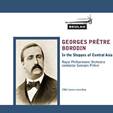
First released on HMV ASD509, this was perhaps the least well known
work in a collection of popular Russian music: Mussorgsky’s Night
on the Bare Mountain, etc. Trevor Harvey was by implication a bit
sniffy about the programme though he enjoyed In the Steppes as
a quiet interlude and, quite rightly, praised the quality of the performance
and recording. Like Islamey (above) it’s colourful, though
much more peaceful, so the two together make a very good mini-programme.
Reissue of the Month
 Johannes
BRAHMS (1833-1897) Symphony No.4 in e minor, Op.98 [41:27]
Johannes
BRAHMS (1833-1897) Symphony No.4 in e minor, Op.98 [41:27]
Berlin Philharmonic Orchestra/Wilhelm Furtwängler
BEULAH EXTRA 4-7BX31 [41:27] – from eavb.co.uk
[see below: Beethoven and Brahms]
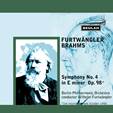
With the release of the projected iTunes album (below) delayed, I’m
pleased that Beulah have decided to produce this recording of the Brahms
Fourth Symphony separately – a high-quality performance to match
my benchmark, Klemperer, shining through the less than ideal recorded
sound. In a normal Download News this would be a clear Reissue
of the Month. See below for full details.
Nicolaus BRUHNS (1665-1697) Prelude and Fugue No.2 in e minor
[8:52]
Hans Heintze (organ) – rec. 1956. ADD/mono
BEULAH EXTRA 1BX251 [8:52] – from eavb.co.uk
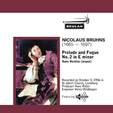
This recording appeared on DG Archiv APM14081 in 1958, coupled with
two other works by Bruhns and four by Lübeck. Though we have had
more recordings of organ and vocal music by the North German baroque
masters since then, DS’s recommendation not to miss the recording
holds good as much today as it did then; indeed, I hope that Beulah
will give us the rest of that LP in short order.
Frédéric CHOPIN (1810-1849) Piano Concerto No.2
in f minor, Op.21 [34:49]
Stefan Askenase (piano)
Berlin Philharmonic Orchestra/Leopold Ludwig – rec.1960. ADD/stereo
BEULAH EXTRA 3-5BX172 [34:49] – from eavb.co.uk
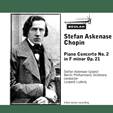 Stefan
Askenase and Támas Vásáry were the two Chopin stars
in the DG firmament in the 1960s and the general consensus awarded the
palm to Vásáry in the second piano concerto on the basis
that Askenase captures the romantic side of the composer well but sells
the heroic qualities a little short. I see the point; it’s a little
dreamy but I like Chopin that way, so I enjoyed this well-transferred
download.
Stefan
Askenase and Támas Vásáry were the two Chopin stars
in the DG firmament in the 1960s and the general consensus awarded the
palm to Vásáry in the second piano concerto on the basis
that Askenase captures the romantic side of the composer well but sells
the heroic qualities a little short. I see the point; it’s a little
dreamy but I like Chopin that way, so I enjoyed this well-transferred
download.
Now that the Rubinstein performances of both concertos are available
in decent sound – review
and November
2010 DL Roundup – their hegemony is even more assured. I wrongly
said that the amazon.co.uk download was at 320kb/s – it’s
actually around 220, but still preferable to the thin LP sound. The
two concertos are, however, available in 320kb/s sound for £3.99
from sainsburysentertainment.co.uk;
the Amazon has now gone up to £4.49. Beulah have already given
us the 1937 Rubinstein/Barbirolli recording of the first concerto (1-3BX73
– see February
2011 DL Roundup).
John DOWLAND (1563-1626)
Mignarda (Galliard); Galliard upon a galliard of Daniel Batchelor;
Batell Galliard
Julian Bream (lute) – rec. 1960. ADD/stereo
BEULAH EXTRA 4BX184 [9:54] – from eavb.co.uk
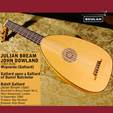 Julian
Bream’s recordings have come and, sadly, mostly gone on CD from
RCA. All that seems to be left from them consists of mere scraps of
the series that was available and a multi-CD set. The DG reissue of
his Westminster recordings from 1954 and 1956 of music by Dowland and
Bach, released to great acclaim only a couple of years ago, now seems
to be available for download only.
Julian
Bream’s recordings have come and, sadly, mostly gone on CD from
RCA. All that seems to be left from them consists of mere scraps of
the series that was available and a multi-CD set. The DG reissue of
his Westminster recordings from 1954 and 1956 of music by Dowland and
Bach, released to great acclaim only a couple of years ago, now seems
to be available for download only.
Recorded by Decca for RCA, Bream’s playing is all that you could
wish – still my benchmark in spite of several recommendable modern
releases – and the recording has come up bright as new. With limited
stocks reported by at least one online dealer for the Bream CD The
Golden Age of English Lute Music, this separate Beulah release is
very welcome. The original LP, SB2150, also contained music by Dowland’s
contemporaries, some of which Beulah have already given us: Holborne
(3BX184), Johnson (1BX184) and Cutting (2BX184).
Georg Frideric HANDEL (1685-1759)
Entrée, Gavotte, Air lentement and Concerto
(allegro) from Aylesford Collection (ed. Squire and Maitland)
Thurston Dart (organ of St John’s, Wolverhampton) – rec. c.1957.
ADD/mono
BEULAH EXTRA 22BX69 [6:20] – from eavb.co.uk
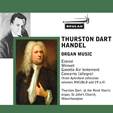
This is the A-side of the 7" ep from which the Purcell organ works
(below) are also taken and it represents by far the better half of the
programme. The organ – apart from a rather noisy action –
the recorded sound and the performances are brighter than in the Purcell
and the reissue is very worthwhile indeed. The cost is a mere £0.50;
what’s not to recommend for such a small outlay? There’s some
inevitable tape hiss but the recording is otherwise fine.
Felix MENDELSSOHN (1809-1847) Hebrides Overture, Op.26
Berlin Philharmonic Orchestra/Herbert von Karajan – rec.1962. ADD/stereo
BEULAH EXTRA 11BX18 [20:13] – from eavb.co.uk
(mp3)
New Symphony Orchestra/Heinz Unger – rec.1944. ADD/mono
BEULAH EXTRA 2BX33 [20:21] – from eavb.co.uk
(mp3)
Berlin Philharmonic Orchestra/Wilhelm Furtwängler – rec.1931.
ADD/mono
BEULAH EXTRA 3BX31 [20:30] – from eavb.co.uk
(mp3)
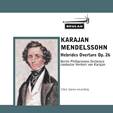 Karajan:
for a mere £0.50 or $0.76 this is well worth investing in even
if you have other recordings of the Overture, including Karajan’s
own later DG version, with the Scottish Symphony. The swimming
bath acoustic complained of in 1962 is hardly in evidence in this transfer
and though the overall sound is not of the very clearest, even rather
damped down for its vintage, the result is more than acceptable. The
performance presents the music not as a piece of pretty early-romantic
picture-painting but as a work of some stature, so your response will
depend on how you expect to react to that.
Karajan:
for a mere £0.50 or $0.76 this is well worth investing in even
if you have other recordings of the Overture, including Karajan’s
own later DG version, with the Scottish Symphony. The swimming
bath acoustic complained of in 1962 is hardly in evidence in this transfer
and though the overall sound is not of the very clearest, even rather
damped down for its vintage, the result is more than acceptable. The
performance presents the music not as a piece of pretty early-romantic
picture-painting but as a work of some stature, so your response will
depend on how you expect to react to that.
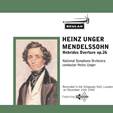 Unger:
an older recording than the Karajan and sounding so – if the latter
sounds a little damped down at first hearing, for all that Beulah have
done to improve matters it’s much more open by comparison with
this 1944 version. Yet I hear the faëry sounds of Mendelssohn’s
Midsummer Night’s Dream in this performance more than in
Karajan’s recording, so the two make an interesting paired contrast.
It’s interesting to note that the 1945 review assumed that the
reader didn’t know what is now such a familiar work and concentrated
more on explaining the music than on the performance – aptly described
as ‘canny’, though that’s hardly a term that reviewers
would use nowadays. It’s interesting, too, to note that wartime
austerity meant that there were only three orchestral recordings to
review that month – at least the reviewers weren’t as overwhelmed
as one sometimes feels today.
Unger:
an older recording than the Karajan and sounding so – if the latter
sounds a little damped down at first hearing, for all that Beulah have
done to improve matters it’s much more open by comparison with
this 1944 version. Yet I hear the faëry sounds of Mendelssohn’s
Midsummer Night’s Dream in this performance more than in
Karajan’s recording, so the two make an interesting paired contrast.
It’s interesting to note that the 1945 review assumed that the
reader didn’t know what is now such a familiar work and concentrated
more on explaining the music than on the performance – aptly described
as ‘canny’, though that’s hardly a term that reviewers
would use nowadays. It’s interesting, too, to note that wartime
austerity meant that there were only three orchestral recordings to
review that month – at least the reviewers weren’t as overwhelmed
as one sometimes feels today.
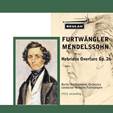 Furtwängler:
if you have already read my take on Furtwängler’s Brahms (above),
you may not be surprised to learn that this performance appealed from
the start and that it’s one of my favourite performances of the
work, despite the dated early-electric 78 recording. In fact, Beulah
have tidied up the sound so well that there’s nary a vestige of
surface noise when played at a reasonable volume over loudspeakers and
it sounds little inferior, if at all, to the Unger recording of 1944.
There are – or have been – reissues of later Furtwängler
recordings of this overture, perhaps better recorded, but this is well
worth your while. In 1932 the 78 recording cost 5/– (£0.25,
at least £20 in today’s values); now it can be yours for
just £0.50/$0.76. How’s that for value?
Furtwängler:
if you have already read my take on Furtwängler’s Brahms (above),
you may not be surprised to learn that this performance appealed from
the start and that it’s one of my favourite performances of the
work, despite the dated early-electric 78 recording. In fact, Beulah
have tidied up the sound so well that there’s nary a vestige of
surface noise when played at a reasonable volume over loudspeakers and
it sounds little inferior, if at all, to the Unger recording of 1944.
There are – or have been – reissues of later Furtwängler
recordings of this overture, perhaps better recorded, but this is well
worth your while. In 1932 the 78 recording cost 5/– (£0.25,
at least £20 in today’s values); now it can be yours for
just £0.50/$0.76. How’s that for value?
Wolfgang Amadeus MOZART (1756-1791)
Piano Concerto No.14 in E-flat, K449
Walter Klien (piano)
Vienna Pro Musica Orchestra/Paul Angerer – rec. 1961. ADD/stereo
BEULAH EXTRA 1-3BX233 [21:46] – from eavb.co.uk
Piano Concerto No.6 in B, K238
Géza Anda (piano)
Camerata Academica of the Salzburg Mozarteum – rec. 1962. ADD/stereo
BEULAH EXTRA 7-9BX88 [20:02] – from eavb.co.uk
Piano Concerto No.22 in E-flat, K482
Géza Anda (piano)
Camerata Academica of the Salzburg Mozarteum
BEULAH EXTRA 4-6BX88 [33:35] – from eavb.co.uk
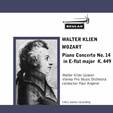 K449:
The sound on the original Vox LPs was variable to say the least and
Beulah deserve real credit for tidying this up at least as well as recent
Regis and Alto reissues of Brendel and Klien in Mozart from this vintage
– and much better than the Regis Mozart Double Concerto featuring
the two pianists; they’ve also managed to spell his name correctly,
unlike Regis.
K449:
The sound on the original Vox LPs was variable to say the least and
Beulah deserve real credit for tidying this up at least as well as recent
Regis and Alto reissues of Brendel and Klien in Mozart from this vintage
– and much better than the Regis Mozart Double Concerto featuring
the two pianists; they’ve also managed to spell his name correctly,
unlike Regis.
There’s an obvious rival version of Concerto No.14 on Alto ALC1074
from Alfred Brendel and the Solisti di Zagreb with Antonio Janigro,
coupled with Concerto No.9 and Piano Sonata No.9, which I made Bargain
of the Month. The original Vanguard recording on that CD was
much better than Vox had given to him or to Klien and that recording
takes some beating, even with the modern competition, some of it recorded
with Mozart’s alternative string quartet accompaniment. Nevertheless,
I enjoyed Klien’s light touch on Beulah enough to be sure that
I shall be listening to this alongside Brendel and more recent competitors.
The Vienna Pro Musica were never that city’s greatest but they
play well enough here. At 7:12 the second movement is a tad slow, but
that didn’t worry me.
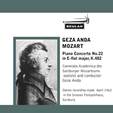 K238/K482:
I got to know many of the Mozart piano concertos from Géza Anda’s
DG recordings and I still hold them in high regard. These two recordings
appeared together on SLPM 138824 in 1962, when I’m surprised to
see that Jeremy Noble was somewhat disappointed. There are more powerful
recordings of K482 but Anda’s is by no means of the Meissen figurine
variety and I’m more of the mind of Robert Layton, who recommended
the reissue of this concerto with Anda’s recording of No.21 (K467),
a recording which shot to fame after its use in the film Elvira Madigan.
K238/K482:
I got to know many of the Mozart piano concertos from Géza Anda’s
DG recordings and I still hold them in high regard. These two recordings
appeared together on SLPM 138824 in 1962, when I’m surprised to
see that Jeremy Noble was somewhat disappointed. There are more powerful
recordings of K482 but Anda’s is by no means of the Meissen figurine
variety and I’m more of the mind of Robert Layton, who recommended
the reissue of this concerto with Anda’s recording of No.21 (K467),
a recording which shot to fame after its use in the film Elvira Madigan.
The Beulah transfers are very good – little short of the quality
of Linn’s more expensive Studio Master reissue of Concertos 6,
17 and 21 – Reissue of the Month: July
2012/2 DL Roundup – and a good deal less expensive. If you
bought that download, so don’t need Concerto No.6, Beulah allow
you to purchase No.22 separately.
K238 may be smaller beer by comparison but most composers would have
given their eye teeth to have written anything as good and Anda brings
out the best of it.
Henry PURCELL (1659-1695)
Beulah originally planned an iTunes album of vintage performances of
Purcell’s music, but the album proved too complex for that medium,
so several individual tracks have been released on Beulah Extra, as
follows:
Suite in g minor, Z661: George Malcolm – rec.1962. ADD/stereo
BEULAH EXTRA 4BX24 [7:16] – from eavb.co.uk
(mp3)
Twelve Lessons from Musicks Handmaid: George Malcolm
BEULAH EXTRA 5BX24 [14:52] – from eavb.co.uk
(mp3)
Voluntary in G, Z720
Voluntary in C, Z717
Verse in F, Z716
Thurston Dart (organ of All Saints, Rotherhithe) – rec. c.1957.
ADD/mono
BEULAH EXTRA 23BX69 [5:37] – from eavb.co.uk
(mp3)
The fatal hour comes on apace, Z421
Joan Alexander (soprano); Arnold Goldsborough (harpsichord); Ambrose
Gauntlett (cello)
From HMV History of Music in Sound, HMS58, released 1954 – ADD/mono
BEULAH EXTRA 1BX254 [3:57] – from eavb.co.uk
(mp3)
Welcome Ode, Z340 (Welcome, vicegerent of the mighty King)
What shall be done in behalf of the man?
Alfred Deller (counter-tenor); Richard Lewis (tenor); Norman Walker
(bass)
London Chamber Singers and Orchestra/Anthony Bernard
From HMV History of Music in Sound HMS57. ADD/mono
BEULAH EXTRA 7BX95 [4:23] – from eavb.co.uk
(mp3)
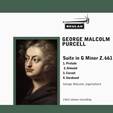 George
Malcolm’s harpsichord was a monster by today’s more authentic
standards, with 16-foot tone aplenty, but his importance as a pioneer
of early music, alongside Thurston Dart, whom Beulah have also done
proud, cannot be overstated. With very few exceptions, everyone played
large-scale beasts in those days and Malcolm does so with much more
restraint than most of his contemporaries whose recordings now remain
like the stuffed dodos in museums. So, although these wouldn’t
be my first choice – certainly not my only choice – these
recordings are well worth having alongside, say, Richard Egarr’s
selection on Harmonia Mundi which includes all eight suites, Z660-663
and 666-669 (HMU907428).
George
Malcolm’s harpsichord was a monster by today’s more authentic
standards, with 16-foot tone aplenty, but his importance as a pioneer
of early music, alongside Thurston Dart, whom Beulah have also done
proud, cannot be overstated. With very few exceptions, everyone played
large-scale beasts in those days and Malcolm does so with much more
restraint than most of his contemporaries whose recordings now remain
like the stuffed dodos in museums. So, although these wouldn’t
be my first choice – certainly not my only choice – these
recordings are well worth having alongside, say, Richard Egarr’s
selection on Harmonia Mundi which includes all eight suites, Z660-663
and 666-669 (HMU907428).
In fact, so good is Malcolm’s performance that it will whet your
appetite for a version of the complete set and the recording, first
released in a 6-LP box set on the Cantate label, with the title das
lebendige Konzert, and reissued on a budget Oryx LP in 1970, is
clear and bright enough to allow you enjoy the playing. If Z661 is attractive,
the selections from Musicks Handmaid are even more so, pace the drubbing
which the reissue received.
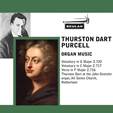 The
recording of Thurston Dart playing the organ music has worn less
well, with a small amount of surface noise apparent and the tone slightly
plummy, coarse and slightly wavery – it was released on a 7"
ep and memory suggests that these seldom matched the quality of LPs
– but none of these factors spoiled my enjoyment of hearing this
forerunner of the authentic movement. Purcell’s genius lay mainly
in his vocal and ensemble music but the three short organ pieces here
certainly merit hearing in their own right.
The
recording of Thurston Dart playing the organ music has worn less
well, with a small amount of surface noise apparent and the tone slightly
plummy, coarse and slightly wavery – it was released on a 7"
ep and memory suggests that these seldom matched the quality of LPs
– but none of these factors spoiled my enjoyment of hearing this
forerunner of the authentic movement. Purcell’s genius lay mainly
in his vocal and ensemble music but the three short organ pieces here
certainly merit hearing in their own right.
Beulah have already given us Thurston Dart’s recordings of Purcell’s
Nine Keyboard Suites on nine Beulah Extra releases, 7BX69-17BX69,
also released as an album on iTunes – reviewed in June
2011/2 DL Roundup.
When The fatal hour comes on apace was reviewed in 1954, Joan
Alexander’s contribution was not mentioned but the harpsichord
continuo was praised. Both this and the Alfred Deller performance of
parts of two Welcome Odes are taken from HMV History of Music in Sound
recordings, issued in albums of 78s well into the LP era. With modern
recordings of both*, these might seem like mere historical curiosities,
especially as that 1954 review also omitted to mention Deller’s
part – surely counter-tenors were not that common then? –
praising instead Bernard’s light, dancing rhythm, Walker’s
singing and the accompanying recorders (and justly so).
* for Z421 the Deller Consort on a collection of Purcell works on an
inexpensive Regis CD, RRC1366 or the King’s Consort (Hyperion
CDA66730 or Hyperion Helios CDH55303); for Z340 and Z341
the Complete Odes and Welcome Songs (King’s Consort, Hyperion
CDS44031/8; Z340 still available as single-album download of
CDA66598 – from hyperion-records.co.uk,
currently £6.00, and Z341 on CDA66587 – from hyperion-records.co.uk,
currently only £4.00).
Historical the Beulah reissues may be, but the Deller recording in particular
is of far more than curiosity value and both recordings have brushed
up very nicely indeed.
Pyotr Il’yich TCHAIKOVSKY (1840-1893)
Manfred Symphony in b minor, Op.58
London Symphony Orchestra/Eugene Goossens – rec.1959 ADD/stereo
BEULAH EXTRA 2-5BX252 [48:01] – from eavb.co.uk
(mp3)
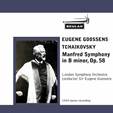 I’ve
always thought the Manfred Symphony under-rated by comparison
with the regular numbered symphonies. It was certainly something of
a rarity when Eugene Goossens recorded it for Everest in 1959, which
is presumably why, unfortunately, it had to be presented in a severely
cut form. The extent of the cut can be seen by comparing the time with
the Mariss Jansons (53:43, see below) and Vasily Petrenko recordings
(57:46, see below). Yet, for all that, Goossens brings out the music’s
drama.
I’ve
always thought the Manfred Symphony under-rated by comparison
with the regular numbered symphonies. It was certainly something of
a rarity when Eugene Goossens recorded it for Everest in 1959, which
is presumably why, unfortunately, it had to be presented in a severely
cut form. The extent of the cut can be seen by comparing the time with
the Mariss Jansons (53:43, see below) and Vasily Petrenko recordings
(57:46, see below). Yet, for all that, Goossens brings out the music’s
drama.
I enjoyed hearing this recording – only briefly available in the
UK on Everest CD – especially as the transfer has been well made,
but the more recent of Naxos’s two recordings would make a better
recommendation and it’s available to download from classicsonline.com
for £4.99: RLPO/Petrenko with Voyevoda – December
2008 DL Roundup.
Music and Arts have reissued Toscanini’s 1953 recording with his
Romeo and Juliet, and that’s available from eclassical.com
in mp3 and lossless sound, but be warned that there are cuts in
that too and the orchestration is (often heavily) touched up. If you
are looking for the complete Tchaikovsky symphonies, including Manfred,
Chandos offer the Mariss Jansons complete set at a reasonable price
– CHAN10392: from theclassicalshop.net
in mp3 or lossless.
Beulah Albums
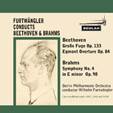 2PD72:
Wilhelm Furtwängler conducts the Berlin Philharmonic in Ludwig
van BEETHOVEN (1770-1827) – Große Fuge, Op.133
and Egmont Overture, Op.84, and Johannes BRAHMS (1833-1897)
Symphony No.4 in e minor, Op.98, recorded live in 1947, 1948 and 1954
[64:19] – due from iTunes
2PD72:
Wilhelm Furtwängler conducts the Berlin Philharmonic in Ludwig
van BEETHOVEN (1770-1827) – Große Fuge, Op.133
and Egmont Overture, Op.84, and Johannes BRAHMS (1833-1897)
Symphony No.4 in e minor, Op.98, recorded live in 1947, 1948 and 1954
[64:19] – due from iTunes
Despite Beulah’s best efforts, the sound in the Große
Fuge is rather raw and shrill, though tolerable, especially as the
performance is well worth hearing – strong and capturing the quirkiness
of Beethoven’s late quartets, in which form this movement first
appeared, but without achieving quite the cragginess of Klemperer’s
performance which, of course, is available in later and better recorded
sound. The work emerges here as the descendant of Bach which it is.
The Egmont Overture is perhaps the least important item here,
but it receives a good performance. Once again the sound is thin and
dated but tolerable.
The Brahms symphony not only stands at the peak of his orchestral achievements,
it’s one of the dozen or so greatest works in the repertoire for
me, but it’s very difficult to bring off. Of the recordings that
I know only Klemperer, recently reissued again by EMI, and James Loughran
(Classics for Pleasure, no longer available) make the grade. Boult comes
very close on a recent release on the ICA label, coupled with Mendelssohn’s
Italian Symphony – see 2013/4
Download News. To these I’m very happy to add Furtwängler’s
spellbinding interpretation – I’m not sure that he doesn’t
hit the mark even more accurately than Klemperer. The recording is shrill
and crumbly; though it’s tolerable and I could almost ignore it
by the end of the finale, it wouldn’t be my regular choice for
listening to this symphony, but I wouldn’t want to be without it.
I know someone with a large collection of recorded music who refuses
to listen to live recordings more than once because he remembers where
the coughs and splutters occur and tenses up when they are due. There
are quite a few in the Brahms, so this very fine Beethoven and enthralling
Brahms album would not be for him, but he would be missing a treat.
This was due in late May from iTunes and amazon.co.uk but has been delayed.
I trust that Amazon will not be offering the opening movement of Vaughan
Williams’ Sea Symphony on track 6 instead of the finale
of the Brahms, as stated in their pre-release material – if you
purchase from them, be sure that you receive the correct goods. See
above for separate Beulah Extra release of the Brahms, costing just
£3.00 for a first-rate performance.
Beulah have three other recordings of the Brahms Fourth: on Beulah Extra
1-4BX92 Max Fiedler comes close to offering a fine performance
but there’s a little too much rubato for my liking and the recording
(1929) is too dated for enjoyment – see October
2010 Download Roundup. Both Rob Barnett and I enjoyed hearing Karl
Rankl (1944) on 1-4BX22 but again the sound is dated. Josef Krips
with the LSO comes pretty close to matching Klemperer and Furtwängler
and his recording sounds much better than any of the other mono recordings
that I’ve mentioned (5-8BX85) – see December
2010 Download Roundup for the Rankl and Krips.
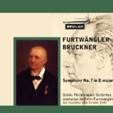 1PD72:
Anton BRUCKNER (1824-1896) Symphony No.7 in E, WAB107 [61:11], recorded
by the Berlin Philharmonic and Wilhelm Furtwängler in October 1949.
The sound is a bit crumbly in places but perfectly tolerable. Authenticity
in Bruckner was hardly on anyone’s minds in 1949 – to have
anything other than the Fourth, the Romantic Symphony, recorded
at all was quite something – but the 1885 score wouldn’t be
first choice now. Nor is it fashionable now to pull the tempo around
as much as Furtwängler – and Jochum – did. I like Jochum’s
Bruckner and I enjoyed hearing Furtwängler so, though this wouldn’t
be my first choice for this symphony, it’s more than just a historic
relic. Of the various available recordings of this work which Furtwängler
made, this is by general consent the best. (See Jonathan Woolf’s
review
of the Music and Arts recording, below, for a comparison.) It’s
available from amazon.co.uk
and from iTunes.
1PD72:
Anton BRUCKNER (1824-1896) Symphony No.7 in E, WAB107 [61:11], recorded
by the Berlin Philharmonic and Wilhelm Furtwängler in October 1949.
The sound is a bit crumbly in places but perfectly tolerable. Authenticity
in Bruckner was hardly on anyone’s minds in 1949 – to have
anything other than the Fourth, the Romantic Symphony, recorded
at all was quite something – but the 1885 score wouldn’t be
first choice now. Nor is it fashionable now to pull the tempo around
as much as Furtwängler – and Jochum – did. I like Jochum’s
Bruckner and I enjoyed hearing Furtwängler so, though this wouldn’t
be my first choice for this symphony, it’s more than just a historic
relic. Of the various available recordings of this work which Furtwängler
made, this is by general consent the best. (See Jonathan Woolf’s
review
of the Music and Arts recording, below, for a comparison.) It’s
available from amazon.co.uk
and from iTunes.
There’s more of Furtwängler in Bruckner on Music and Arts
CD-1209, a 5-CD set of Symphonies Nos.4-9 in performances from 1942
to 1951 with the BPO and VPO – a different version of No.7 –
review.
Download from eclassical.com
(mp3 and lossless) but NB: the CD set can be had for much less than
the download.
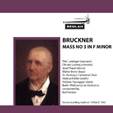 There’s
more BRUCKNER on 2PD79: Mass No.3 in f minor, Karl Forster
conducting a distinguished set of soloists, the St Hedwig’s Choir
and the Berlin Philharmonic in 1962. The LP had the misfortune to be
released at the same time as Eugen Jochum’s on DG and the general
consensus has always favoured Jochum. He has a slightly better set of
soloists and offers a slightly more affective interpretation overall,
without too many of the abrupt changes of gear which some have found
to spoil their enjoyment of his Bruckner symphonies. (Bruckner Complete
Masses, 447 4092 – download from deutschegrammophon.com,
mp3 or flac)
There’s
more BRUCKNER on 2PD79: Mass No.3 in f minor, Karl Forster
conducting a distinguished set of soloists, the St Hedwig’s Choir
and the Berlin Philharmonic in 1962. The LP had the misfortune to be
released at the same time as Eugen Jochum’s on DG and the general
consensus has always favoured Jochum. He has a slightly better set of
soloists and offers a slightly more affective interpretation overall,
without too many of the abrupt changes of gear which some have found
to spoil their enjoyment of his Bruckner symphonies. (Bruckner Complete
Masses, 447 4092 – download from deutschegrammophon.com,
mp3 or flac)
I was critical of the recording quality on an earlier Beulah album containing
Forster’s performance of Mass No.2 (1PD79 – 2013/6
DL News), but I understand that it’s gone on to be a best-seller.
This time the later stereo recording sounds much better, though still
a trifle thin (or bright if you prefer), even for its date; I’d
no longer describe it as having warm and full-blooded sonority, as Derek
Cooke did in 1963, though it’s much more than adequate. Certainly
those who bought and enjoyed the earlier Foster recording will find
the sound here more amenable and I enjoyed listening much more than
to the earlier recording.
Available from iTunes
and, slightly less expensively, from amazon.co.uk.
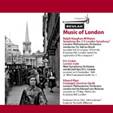 1PD77:
Music of London offers Ralph VAUGHAN WILLIAMS’ Symphony
No.2, ‘A London Symphony’ in the classic Decca recording made
in January 1952 by the London Philharmonic and Sir Adrian Boult, with
the composer supervising. In many ways this remains the benchmark for
later versions and it’s the one to which I still return most often
unless I wish to hear the very special Richard Hickox recording of the
original, longer version, rolled out once only by permission of the
Vaughan Williams Trust (Chandos CHAN9902/CHSA5001). Unfortunately,
the Chandos USB collection of all the VW symphonies has now been deleted,
but individual albums remain available on (SA)CD or as downloads.
1PD77:
Music of London offers Ralph VAUGHAN WILLIAMS’ Symphony
No.2, ‘A London Symphony’ in the classic Decca recording made
in January 1952 by the London Philharmonic and Sir Adrian Boult, with
the composer supervising. In many ways this remains the benchmark for
later versions and it’s the one to which I still return most often
unless I wish to hear the very special Richard Hickox recording of the
original, longer version, rolled out once only by permission of the
Vaughan Williams Trust (Chandos CHAN9902/CHSA5001). Unfortunately,
the Chandos USB collection of all the VW symphonies has now been deleted,
but individual albums remain available on (SA)CD or as downloads.
Boult recorded the VW symphonies again for EMI in stereo (a 6-CD box
set), but this 1952 recording has, understandably, hardly been out of
the catalogue over the years and I’ve owned many of the reissues,
including a mock-stereo LP on the Decca Eclipse label. It remains available
in several formats, including an mp3 download on the Naxos Classical
Archives label for just £1.99 (not available in the USA, Australia
or Singapore) and on a 5-CD set of all nine symphonies from Decca (473
2412, around £20). There’s also a super-bargain offer
from amazon.co.uk, all the symphonies for just £7.49 – here:
see November
2010 DL Roundup for that and the Decca set as a download. (Download
the Decca set from 7digital.com,
though you should find the CDs for less than the download asking price
– the Passionato link no longer applies.)
There’s only rival recording from the 1950s, performed by the Hallé
under Sir John Barbirolli for Nixa and no longer available. NB to Beulah
and others – that would also make a very fine reissue and I’m
sure that it could be made to sound better than when I last heard it
on a Pye Golden Guinea LP.
All the recent re-masterings of the Boult that I’ve heard, even
including the super-bargain, have come up sounding well, capturing the
rich scoring of this work, but the Beulah is by a margin the best of
the bunch. Add the London Suite No.1 conducted by its composer,
Eric COATES, with the New Symphony Orchestra of London in 1948,
and Sir Edward ELGAR’s Cockaigne Overture recorded
by the London Philharmonic Orchestra and Eduard van Beinum in 1949 and
this becomes a tempting proposition. Older readers will remember the
third movement of the London Suite, Knightsbridge, being
used as the signature tune of the long-running Saturday evening radio
(and briefly TV) show, In Town Tonight.
If you’re tempted to discover more of Coates’ music, your
next port of call should be a wonderful and inexpensive 2-CD set on
Classics for Pleasure, conducted by the likes of Sir Charles Groves
and Sir Charles Mackerras: download for £4.99 from sainsburysentertainment.co.uk.
This powerfully evocative recording of Cockaigne remains available
on an earlier Beulah CD release of Elgar, 2PD15 – from eavb.co.uk;
see also Visions of Elgar, below – but its reappearance
as the culmination of a programme of music about London is extremely
apt, beginning and ending the album with works which incorporate the
Westminster Chimes. Despite their 78rpm origins, the Coates and Elgar
sound fine, with just a very occasional hint of surface noise. From
iTunes for £6.99 – here
– and from amazon.co.uk
for £7.49.
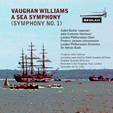 6PD12:
just over a year after recording the London Symphony, in December 1953,
Boult and the LPO turned to the VAUGHAN WILLIAMS Sea Symphony,
with Isobel Baillie, John Cameron and the London Philharmonic Choir,
again under the watchful eye of the composer. Once again, despite the
availability of some very fine later recordings, this is still my benchmark
version and it’s also come up sounding very well indeed in the
Beulah transfer – still as ‘stupendous’ in its way as
when it was so described back by AR in 1954.
6PD12:
just over a year after recording the London Symphony, in December 1953,
Boult and the LPO turned to the VAUGHAN WILLIAMS Sea Symphony,
with Isobel Baillie, John Cameron and the London Philharmonic Choir,
again under the watchful eye of the composer. Once again, despite the
availability of some very fine later recordings, this is still my benchmark
version and it’s also come up sounding very well indeed in the
Beulah transfer – still as ‘stupendous’ in its way as
when it was so described back by AR in 1954.
It’s due for release from iTunes and Amazon for a good deal less
in real terms than the 72/11 in 1954 on two LPs, with the Wasps
music (current value around £90). Who could have imagined in 1954
the amount of music that I’ve stored on the same 16GB USB stick
as this Beulah reissue – my Denon and Onkyo systems have slots
on the front, designed for the iPod but equally capable of playing music
direct from a USB stick, including the Warner Classics release of the
complete music of Bach which I recommended recently – review.
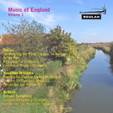 1PD76
– Music of England I – from iTunes
or amazon.co.uk:
this opens with Eugene Ormandy’s performances of Frederick DELIUS
On hearing the first Cuckoo in Spring and Brigg Fair
with his own Philadelphia Orchestra. I’d forgotten how good Ormandy’s
Delius is, though I once owned these two performances on a CBS LP, together
with some of the shorter pieces which Beecham recorded for Columbia.
Recorded in stereo around 1960, the Ormandy items always sounded much
better than those earlier Beecham recordings and they have come up very
well indeed in this Beulah transfer.
1PD76
– Music of England I – from iTunes
or amazon.co.uk:
this opens with Eugene Ormandy’s performances of Frederick DELIUS
On hearing the first Cuckoo in Spring and Brigg Fair
with his own Philadelphia Orchestra. I’d forgotten how good Ormandy’s
Delius is, though I once owned these two performances on a CBS LP, together
with some of the shorter pieces which Beecham recorded for Columbia.
Recorded in stereo around 1960, the Ormandy items always sounded much
better than those earlier Beecham recordings and they have come up very
well indeed in this Beulah transfer.
Sir Adrian Boult recorded Vaughan WILLIAMS’ Partita for
Double String Orchestra around the same time and the recording was issued
with Symphony No.8, the only LP in the series to be in true stereo.
The Partita is not included on any of the collected sets –
Nos.7 and 8 are coupled on both the Decca and the super-budget download.
The Boult performance is included in a budget-price Double Decca with
other works which you may have and Boult’s later EMI recording
is tied up in large box sets, so its reissue by Beulah is very welcome
indeed. It may not be VW’s greatest music by quite a margin but
its placing here after the two Delius works is very apt and the performance
is as idiomatic as those of the symphonies.
The album is rounded off with the LSO and Sir Malcom Sargent in Benjamin
BRITTEN’s Simple Symphony. An early work it may be but its
charms are well brought out in this performance. It originally appeared
with music by Holst (The Perfect Fool ballet music, which we
already have from Beulah on 28BX13 – June
2012/2 DL Roundup) and Walton (the Façade Suite) but
its appearance here is equally apt. These recordings are all in stereo,
dating from 1960-1962, and all have been made to sound well in these
transfers.
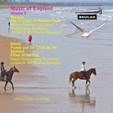 Coming
soon: 2PD76: Music of England II: classic Beecham recordings of
music by Lord Berners (The Triumph of Neptune Suite) Arnell (Punch
and the Child) and Bantock (Fifine at the Fair), all 1950s
mono. Though these recordings of Berners and Bantock are available inexpensively
in a recent EMI compendium of Beecham recordings, the separate Beulah
release will appeal especially to those who already have earlier reissues
of Beecham’s Delius which makes up the bulk of that set. Surprisingly,
there seems to be only one alternative recording of the Arnell (Dutton,
an all-Arnell programme).
Coming
soon: 2PD76: Music of England II: classic Beecham recordings of
music by Lord Berners (The Triumph of Neptune Suite) Arnell (Punch
and the Child) and Bantock (Fifine at the Fair), all 1950s
mono. Though these recordings of Berners and Bantock are available inexpensively
in a recent EMI compendium of Beecham recordings, the separate Beulah
release will appeal especially to those who already have earlier reissues
of Beecham’s Delius which makes up the bulk of that set. Surprisingly,
there seems to be only one alternative recording of the Arnell (Dutton,
an all-Arnell programme).
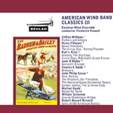 4PD82:
American Wind Band Classics III (Eastman Wind Ensemble/Frederick
Fennell – rec.1954, 1959 and 1961-2) takes us rather further off
the beaten track than the two previous releases. Classics such as Sousa’s
Washington Post rub shoulders with the less familiar, but with
absolutely no sense that these are scrapings from the barrel, though
John Philip Sousa, Morton Gould, William Schuman and Robert Russell
Bennett are probably the only composers whom you’ve heard of. The
others are Clifton Williams, Henry Filmore, Karl L King, John H Ribble
and Charles E Duble, – full details of tracks from iTunes
or amazon.co.uk,
whence the music may be downloaded.
4PD82:
American Wind Band Classics III (Eastman Wind Ensemble/Frederick
Fennell – rec.1954, 1959 and 1961-2) takes us rather further off
the beaten track than the two previous releases. Classics such as Sousa’s
Washington Post rub shoulders with the less familiar, but with
absolutely no sense that these are scrapings from the barrel, though
John Philip Sousa, Morton Gould, William Schuman and Robert Russell
Bennett are probably the only composers whom you’ve heard of. The
others are Clifton Williams, Henry Filmore, Karl L King, John H Ribble
and Charles E Duble, – full details of tracks from iTunes
or amazon.co.uk,
whence the music may be downloaded.
With Universal concentrating on 50-CD whopper reissues of the treasures
from the Mercury catalogue – good value but hard to get through
most letter-boxes – it makes sense for Beulah to concentrate on
single-album reissues like this. It goes without saying that the performances
are first-rate and the transfers excellent; even the oldest track (from
1954) sounds very well.
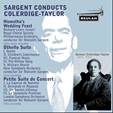 8PD13:
Samuel COLERIDGE-TAYLOR (1875-1912) was clearly a remarkable man
to have succeeded as a black composer, though his music is less fashionable
now than it used to be. One work that has survived in the repertoire
is his Hiawatha Overture, but the related work, Hiawatha’s
Wedding Feast, now exists only in this Beulah transfer of Sir
Malcolm Sargent’s 1962 stereo recording with Richard Lewis (tenor),
Royal Choral Society and Philharmonia Orchestra and on a recent release
on the Heritage label (HTGCD249) – it’s an unfortunate
coincidence not only that both have resurfaced so close in time but
that they offer the same couplings, Othello Suite, Op.70 and
Petite Suite de Concert, Op.77. The Decca 2-CD collection, which
also includes The Death of Minnehaha, Hiawatha’s Departure
and Symphonic Variations – review
– seems to have been deleted but you couldn’t wish for a better
interpreter of the music than Sargent, who did it proud in every way,
as Trevor Harvey reported in 1962.
8PD13:
Samuel COLERIDGE-TAYLOR (1875-1912) was clearly a remarkable man
to have succeeded as a black composer, though his music is less fashionable
now than it used to be. One work that has survived in the repertoire
is his Hiawatha Overture, but the related work, Hiawatha’s
Wedding Feast, now exists only in this Beulah transfer of Sir
Malcolm Sargent’s 1962 stereo recording with Richard Lewis (tenor),
Royal Choral Society and Philharmonia Orchestra and on a recent release
on the Heritage label (HTGCD249) – it’s an unfortunate
coincidence not only that both have resurfaced so close in time but
that they offer the same couplings, Othello Suite, Op.70 and
Petite Suite de Concert, Op.77. The Decca 2-CD collection, which
also includes The Death of Minnehaha, Hiawatha’s Departure
and Symphonic Variations – review
– seems to have been deleted but you couldn’t wish for a better
interpreter of the music than Sargent, who did it proud in every way,
as Trevor Harvey reported in 1962.
The Wedding Feast was all that you got on LP, but both recent
reissues offer more. The Othello Suite on both albums comes from
Sargent again, with the New Symphony Orchestra in 1932, but Heritage
have chosen Sir Dan Godfrey’s recording of the Petite Suite
with the Bournemouth Municipal Orchestra – they also add the
four short Valses, under Ainslie Murray – while Beulah offer
Sargent with the London Symphony Orchestra in 1931. I can’t claim
that the fillers provided much in the way of fresh insight into Coleridge-Taylor’s
music by comparison with the Violin Concerto, which now deservedly exists
in several recorded versions – see below – but I enjoyed hearing
what are clearly idiomatic performances.
The Heritage recording has not yet reached the Naxos Music Library,
so I can’t compare the two transfers, but I doubt that the recording
of the Wedding could be made to sound any better than in this
Beulah transfer. The Petite Suite appeared on two 78s and was
criticised at the time as sounding ‘rather coarse’ but the
Beulah transfer is anything but coarse – very good indeed for 1931.
The Othello Suite has come up sounding so fresh that I hardly
noticed the transition from 1962 to 1932 sound; I’m still as amazed
at the quality of the sound as I was when I reviewed this on 27BX13
in the June
2012/2 DL Roundup. There’s hardly any surface noise on either
of these 78 transfers.
The album is available from iTunes,
Amazon.co.uk
and 7digital.com.
Your next stop on the Coleridge-Taylor exploration trail should be one
of the recordings of his Violin Concerto:
• Hyperion CDA67420: Anthony Marwood; BBC Scottish
SO/Martyn Brabbins (with SOMERVELL Violin Concerto): Recording
of the Month – review
– review
and Hyperion
Top 30 Roundup
• Lyrita SRCD.317: Lorraine McAslan; London PO/Nicholas
Braithwaite (with HARRISON Bredon Hill): Recording of the Month
– review
– review
– review
and December
2008 DL Roundup
• Avie AV044: Philippe Graffin; Johannesburg PO/Michael
Hankinson (with DVOŘÁK Violin Concerto): Recording
of the Month – review
14PD15: Visions of ELGAR is a 4-CD set containing:
• In the South; Symphony No.2: Sir Adrian Boult –
Reissue of the Month: January
2012/1 DL Roundup
• Violin Concerto: Alfredo Campoli/Sir Adrian Boult
• Falstaff; Introduction and Allegro for Strings
– May
2011 DL Roundup
• Cockaigne Overture: Eduard van Beinum – August
2012/1 DL Roundup
• Cello Concerto: Anthony Pini/Eduard van Beinum –
June
2011 DL Roundup
• The Dream of Gerontius (excerpts); I sing the
birth; Imperial March; Pomp and Circumstance Marches 1 and 4; ‘Enigma’
Variations: Sir Malcolm Sargent
• HANDEL (arr. ELGAR) Overture in d minor; BACH
(arr. ELGAR) Fantasia and Fugue in c minor, BWV537: Albert Coates
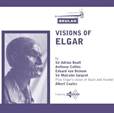
I haven’t heard all of this but the parts which I have heard and
reviewed as separate Beulah Extra releases lead me to believe that it’s
well worth having – and at £7.99 from iTunes
it’s a snip. For the parent CDs from which these recordings are
taken, see Rob Barnett’s 4-star review
and review
by Christopher Howell. The recordings are variable – you can try
out samples from the Beulah website.
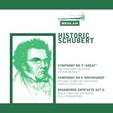 Due
for release soon on 1PD32: Historic Schubert – performances
from the 78 era which have already appeared on CD and on separate Beulah
Extra releases.
Due
for release soon on 1PD32: Historic Schubert – performances
from the 78 era which have already appeared on CD and on separate Beulah
Extra releases.
Bob Briggs thought this a splendid disc – review
– and I see no reason to demur; this is a useful gathering of separate
releases which I’ve heard on Beulah Extra; I reviewed all of these
in the October
2010 DL Roundup:
• 2-3BX7: Symphony No.8 (Fistoulari, 1944)
• 20-23BX12: Symphony No.9 (Boult, 1934)
• 6BX36: Rosamunde Entr’acte (Weingartner, 1928)
There’s another highly recommendable performance of the Symphony
No.9 from the Concertgebouw and Josef Krips in 1952 on Beulah Extra
2-5BX46 – September
2011/1 DL Roundup.











